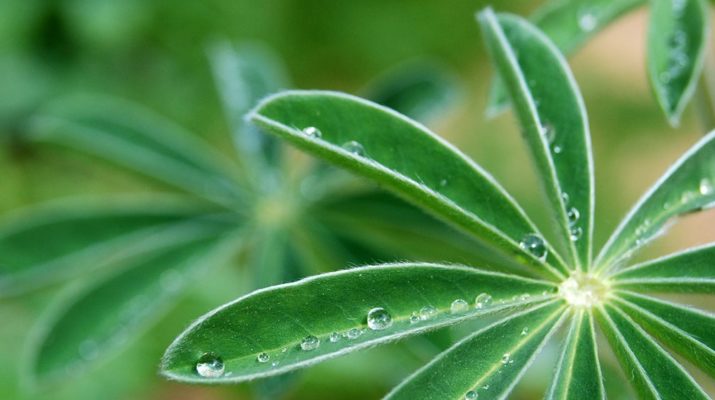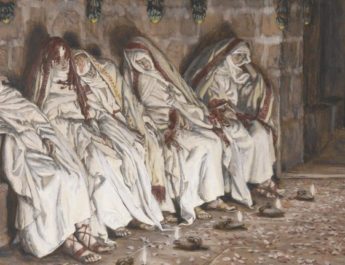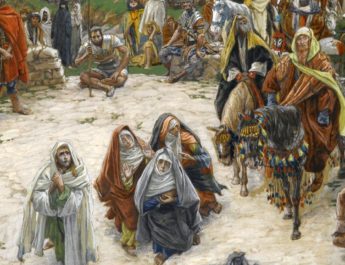Psalm 68:4-13
A Women’s Lectionary Christmas Eve
4 SingA to God,B sing praisesC to his name;D
A “sing” = shir. From shir (song, singer). This is to sing. It could also refer to one who is singing or leading others in song.
B “God” = Elohim.
C “sing praises” = zamar. Perhaps from zamar (to trim or prune). This is making music. It is used specially of music to worship God. So, music with singing, singing praise, or singing psalms.
D “name” = shem. May be from sum (to put, place, set). This is name, fame, renown. A name was thought to indicate something essential about a person – something about their individuality. So, this word can also mean honor, authority, or character.
lift up a songE to him who ridesF upon the cloudsG—
his name is the LordH—
be exultantI beforeJ him.
E “lift up a song” = salal. 12x in OT. This is to lift up, pile, build, make plain, extol, exalt.
F “rides” = rakab. This is to ride an animal or in some vehicle. It can also mean bringing on a horse.
G “clouds” = arabah. From the same as arab (desert plateau, Arabia) OR from arab (to become evening); {from ereb (evening) or from arab (to exchange, give or take on pledge, braid, intermix)}. This is a desert valley or plain, wilderness. Also, the name of a place Arabah.
H “Lord” = Yah. From YHVH (proper name of the God of Israel; God, Lord; the self-existent or eternal one); from havah (to become) or hayah (to be, become, happen)}. This is Lord or God – a shortened form of God’s most holy name.
I “be exultant” = alaz. 16x in OT. This is to jump for joy, rejoice, triumph, or be jubilant.
J “before” = paneh. From panah (to turn, face, appear). This is face in a literal or figurative sense. It could be face, presence, anger, respect. It can also be used of God to indicate divine favor or presence.
5 FatherK of orphansL and protectorM of widowsN
is God in his holyO habitation.P
K “father” = ab. This is father, chief, or ancestor. It is father in a literal or figurative sense.
L “orphans” = yathom. This is a child without a father or more generally a person who is bereaved.
M “protector” = dayyan. 2x in OT. From din (to judge, defend, dispute, govern, quarrel, plead). This is a judge or advocate.
N “widows” = almanah. Related to alman (widowed); from alam (to be silent, bound). This is a widow or a house that is desolate.
O “holy” = qodesh. This is set apart and so sacred. God is different from us and so God is holy/set apart. Things we dedicate to God’s service are set apart for God and so they, too, are holy, etc.
P “habitation” = maon. 17x in OT. From anah (to answer, respond, announce, sing, shout, or testify; to pay attention, which implies responding and, by extension, starting to talk; singing, shouting, testifying, etc.) OR from the same as onah (marriage, living together, marital duty). This is dwelling, den, haunt, retreat. It can refer to the Tabernacle or Temple. It can also be used for homes or animal lairs.
6 God gives the desolateQ a homeR to live in;S
he leads outT the prisonersU to prosperity,V
Q “desolate” = yachid. 12x in OT. From yachad (to join, be united). This is united, sole, solitary, only, or desolate. It can also mean beloved or darling.
R “home” = bayit. Probably from banah (to build, make, set up, obtain children; to build literally or figuratively). This is house, court, family, palace, temple.
S “gives…to live in” = yashab. This is to sit and so to remain and so to dwell. It is sitting for any reason – as a judge, in order to ambush, or just sitting quietly. Causatively, this can mean settling or marrying. This can also mean continue, endure, or establish.
T “leads out” = yatsa. This is to go or come out, bring forth, appear. It is to go out in a literal or figurative sense.
U “prisoners” = asir. 12x in OT. From asar (to tie, yoke, bind, or fasten; can mean to harness an animal, to join in fighting a battle, or to imprison someone). This is a prisoner or captive. It can also refer to a slave or someone otherwise bound.
V “prosperity” = kosharah. 1x in OT. From kasher (to succeed, be proper, be right, be acceptable). This is prosperity or freedom.
butW the rebelliousX liveY in a parched land.Z
W “but” = ak. Related to aken (surely, truly, nevertheless); from kun (properly, in a perpendicular position; literally, to establish, fix, fasten, prepare; figuratively, it is certainty, to be firm, faithfulness, render sure or prosperous). This is a positive statement – surely, also, certainly, alone, only.
X “rebellious” = sarar. 17x in OT. This is turning away, backsliding, rebellious.
Y “live” = shakan. This is to settle down in the sense of residing somewhere or staying there permanently. It can mean abide or continue. “Mishkan,” taken from this verb, is the Hebrew word for the Tabernacle (as a place where God abided).
Z “parched land” = tsechichah. 1x in OT. From tsachiach (shining surface, exposed, top, glaring; a bright surface because the sun shines on it); from tsachach (to be whiter, glare, be dazzling). This is a parched or dry land, the desert.
7 O God, when you went outAA beforeBB your people,CC
when you marchedDD through the wilderness,EE SelahFF
AA “went out” = yatsa. Same as “leads out” in v6. See note T above.
BB “before” = paneh. Same as “before” in v4. See note J above.
CC “people” = am. From amam (to darken, hide, associate; creating shadows by huddling together). This is people or nation. It can be used specifically for a tribe, collectively of troops or armies, or figuratively to refer to a flock of animals.
DD “marched” = tsaad. 8x in OT. This is to step, go, run, walk, to pace. It is to march with a regular step, climb up, hurl down.
EE “wilderness” = yeshimon. 13x in OT. From yasham (to be stripped, destroyed, desolate). This is a wilderness or desert. It can also refer to a place called Jeshimon. It means “wasteland” or “wilderness.” See https://www.abarim-publications.com/Meaning/Jeshimon.html
FF “Selah” = selah. Related to “lift up a song” in v4. From salal (see note E above). This is to lift up or exalt. Also, “selah” in the psalms where its precise meaning is uncertain. It could be a pause in the music, a moment of silence. It could signal a change in the service or mean something akin to amen.
8 the earthGG quaked,HH the heavensII poured downJJ rain
GG “earth” = erets. Root may mean to be firm. This is earth, ground, field land, or country.
HH “quaked” = raash. This is to quake, shake, tremble, shake from fear; leap like a locust.
II “heavens” = shamayim. Root may mean being lofty. This is sky, the air, or heaven. It is in a dual noun form so this might refer to the part of the sky where the clouds move on the one hand and the part beyond that where the sun, moon, and stars are on the other hand.
JJ “poured down” = nataph. 18x in OT. This is to drip, ooze, or drop. It can also refer to the process of gradual distillation that causes liquid to fall drop by drop. Figuratively, it can mean prophesying or inspired speech.
at the presenceKK of God, the God of Sinai,LL
at the presenceMM of God, the God of Israel.NN
KK “presence” = paneh. Same as “before” in v4. See note J above.
LL “Sinai” = Sinay. Probably from the same as Sin (Sin, a city meaning “clay” or “bush); {perhaps from asam (to gather, store) OR from seneh (thorn bush) OR related to Aramaic siyn (a god called Sin) OR perhaps Hebrew siyn (related to mud or clay)}. This is Sinai – a place whose name may mean “bush of the Lord” or “muddy.” See https://www.abarim-publications.com/Meaning/Sinai.html
MM “presence” = paneh. Same as “before” in v4. See note J above.
NN “Israel” = Yisrael. Related to “God” in v4. From sarah (to persist, exert oneself, contend, persevere, wrestle, prevail) + el (see note B above). This is Israel, meaning God strives or one who strives with God; new name for Jacob and for his offspring. This refers to the people and to the land.
9 RainOO in abundance,PP O God, you showered abroad;QQ
you restoredRR your heritageSS when it languished;TT
OO “rain” = geshem. Perhaps from gasham (to rain). This is rain, shower, or rainy. It can be used figuratively for blessing or for destruction.
PP “abundance” = nedabah. From nadab (to offer willingly, volunteer, freely give, be willing). This is a freewill offering, something giving spontaneously.
QQ “showered abroad” = nuph. This is to rock back and forth, wave, sprinkle, quiver, beckon, offer, present.
RR “restored” = kun. Related to “but” in v6. See note W above.
SS “heritage” = nachalah. Related to nachal (to inherit, occupy, distribute, take as heritage). This is properly something that was inherited. It can mean occupancy generally or, more particularly, an heirloom or an estate. This can be an inheritance, gift, possession, or portion.
TT “languished” = laah. 19x in OT. This is to be weary or exhausted, parched, faint, or tired. It could also mean to be impatient, or have a hard time. Figuratively, this could refer to being grieved or disgusted. This is the root verb that Leah comes from.
10 your flockUU found a dwellingVV in it;
in your goodness,WW O God, you providedXX for the needy.YY
UU “flock” = chay. From chayah (to live or keep alive literally or figuratively). This is alive, living, lifetime. It can also be used to describe someone’s age. It can refer to animals, plants, water, or a company or congregation of people. It is life in a very broad sense.
VV “found a dwelling” = yashab. Same as “gives…to live in” in v6. See note S above.
WW “goodness” = tob. From tob (to be pleasing, to be good). This is good, beautiful, pleasant, agreeable, bountiful, at ease. This word is used for goodness as a concept, a good thing, a good person. This can refer to prosperity and welfare as well as joy, kindness, sweetness, and graciousness. So, this is ethically good, but also enjoyably good.
XX “provided” = kun. Same as “restored” in v6. See note RR above.
YY “needy” = ani. From anah (to be bowed down; humility or being browbeaten, oppressed, afflicted, or depressed; literal or figurative – depressed in mood or circumstance). This is humble, lowly, poor, or afflicted.
11 The LordZZ givesAAA the command;BBB
greatCCC is the companyDDD of those who bore the tidings:EEE
ZZ “Lord” = Adonai. From adon (lord, master, owner); root means to rule or be sovereign. This is the actual Hebrew word for Lord used (in a different form) of humans and (in the present form) of God. It means someone who is in control.
AAA “gives” = natan. This is to give, put, set, offer. It is to give literally or figuratively.
BBB “command” = omer. 6x in OT. From emer (speech, thing, utterance, promise, argument, command); from amar (to speak, say, answer, command, promise, report). This is speech, a word, a matter, or a promise.
CCC “great” = rab. From rabab (increasing in any aspect whether quantity, authority, size, quality, greatness, etc.). This is abundance, many, elder, exceedingly, great. It refers to abundance of amount, rank, or status.
DDD “company” = tsaba. From tsaba (to wage war, serve, assemble, fight, perform, muster, wait on). This is a large group of persons (used figuratively for a group of things). It implies a campaign literally as with army, war, warfare, battle, company, soldiers. Can also be used figuratively for hardship or for worship.
EEE “bore the tidings” = basar. This is being a messenger, to publish, carry, or preach. Properly, this is being fresh, rosy or cheerful as one bearing news.
12 “The kingsFFF of the armies,GGG they flee,HHH they flee!”
FFF “kings” = melek. From malak (to be or become king or queen, to rise to the throne, to be crowned; by implication, to take counsel). This is king or royal.
GGG “armies” = tsaba. Same as “company” in v11. See note DDD above.
HHH “flee” = nadad. This is to wave back and forth. Figuratively, it is to flee, stray, flutter chase away, shake, or shrink. It can also refer to a fugitive.
The women atIII home divideJJJ the spoil,KKK
13 though they stayLLL amongMMM the sheepfoldsNNN—
III {untranslated} = naveh. From navah (home, beautify, praise) This is home, place where shepherd or sheep live. It is at home – implies a lovely place or a place of satisfaction. It can also be used for the Temple or a pasture as the home of wild animals.
JJJ “divide” = chalaq. This is to be smooth in a figurative sense. So, it can refer to the stones that were part of casting lots – hence, apportion, share, distribute. Figuratively, it can also mean to flatter.
KKK “spoil” = shalal. From shalal (to plunder, loot, capture). This is spoil, prey, or plunder.
LLL “stay” = shakab. This is to lie down, lodge. It is lying for sleep, sex, or other reasons.
MMM “among” = bayin. From bin (to discern, consider, attend to; distinguishing things in one’s mind or, more generally, to understand). This is among, between, interval.
NNN “sheepfolds” = shaphath. 2x in OT. From shaphath (to lay, ordain, locate, establish, light on fire, bring). This is a hook as over a fireplace for cooking meat. It could also be a pot or cattle stall.
the wingsOOO of a dovePPP coveredQQQ with silver,RRR
its pinionsSSS with greenTTT gold.UUU
OOO “wings” = kanaph. This is wing, edge, corner, extremity. It can also be a flap or fold of a garment or the pinnacle of a building.
PPP “dove” = yonah. Perhaps from yayin (wine; root means to effervesce). This is a dove or pigeon. Used to refer to the exiles coming home, to describe sails of ships. Also used figuratively for mourning or as a description of beauty.
QQQ “covered” = chaphah. 12x in OT. This is to cover, veil, overlay, or protect. It is used for covering one’s head or face or overlaying with precious metals.
RRR “silver” = keseph. From kasaph (to long for, be greedy; to become pale). This is silver or money.
SSS “pinions” = ebrah. 4x in OT. From eber (wing, pinion); from abar (to fly, soar). This is a feather or wing.
TTT “green” = yeraqraq. 3x in OT. From the same as yereq (something green or yellow-green; could be of pallor or some kind of vegetation); from yaraq (to spit). This is yellowish or pale green. It can also mean glistening.
UUU “gold” = charuts. 18x in OT. From charats (to cut, sharpen, decree, wound, be alert, move). This is incisive, diligent, a trench, gold, threshing sledge, pointed thing.
Image credit: “Lupine, Water Drops” by Eran Finkle, 2011.




